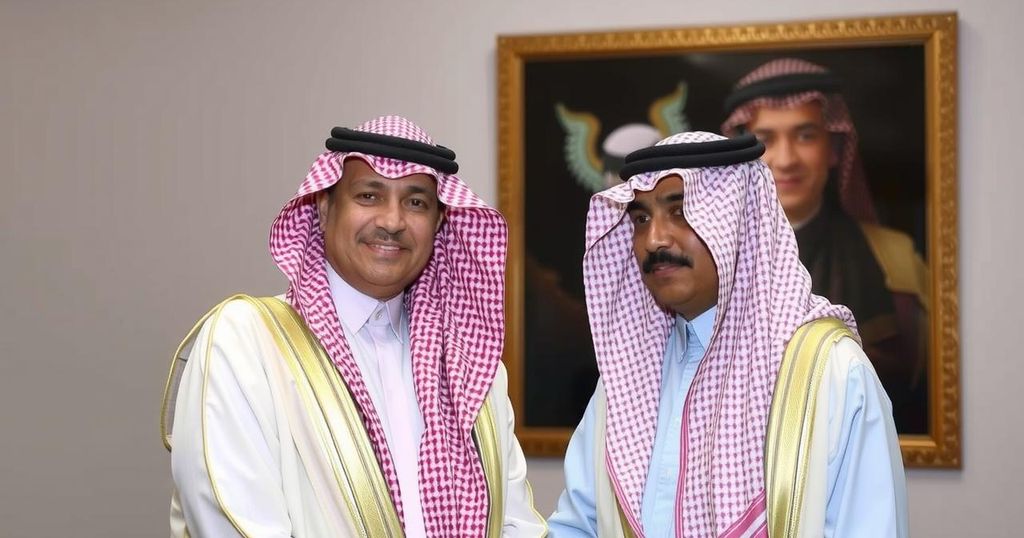Israeli Prime Minister Netanyahu is sending Mossad director David Barnea to Qatar for peace negotiations regarding the Gaza conflict, amid U.S. pressure for a deal. With more than 46,000 Palestinians reported killed, and the hostages’ families demanding action, negotiations continue to face significant challenges despite optimism from U.S. officials.
Israeli Prime Minister Benjamin Netanyahu has dispatched the director of Mossad, David Barnea, to Qatar for ceasefire negotiations concerning the ongoing conflict in Gaza, marking what appears to be a significant stride in dialogue with the Hamas militant group. The timeline for Barnea’s trip to Doha remains uncertain, but it coincides with increased U.S. pressure to secure an agreement before the presidential inauguration on January 20. This development signals the involvement of high-level Israeli officials crucial for finalizing any potential accord.
Past negotiations have been severely stymied, with only one brief ceasefire achieved in the aftermath of the sustained hostilities over the past fifteen months. Current discussions revolve around a phased ceasefire plan; however, Netanyahu has indicated a commitment only to the preliminary stage, which entails a limited release of hostages in exchange for a temporary cessation in combat. In contrast, Hamas insists on a comprehensive withdrawal of Israeli forces from a heavily impacted Gaza territory.
In a related move, Netanyahu has also sent the head of the Shin Bet security agency along with military and political advisors to Qatar, following discussions with Israeli security and defense officials. A photograph was released featuring Netanyahu with Donald Trump’s incoming special envoy to the Middle East, Steve Witkoff, further highlighting the international dimension of these talks. Additionally, the families of the approximately one hundred hostages held in Gaza are urging Netanyahu to reach an urgent agreement to secure their loved ones’ return.
U.S. Secretary of State Antony Blinken has expressed optimism about the negotiations, indicating that a resolution appears to be imminent, coinciding with a transition to the new U.S. administration. The discussions are grappling with complexities regarding which hostages and Palestinian prisoners would be involved in the initial stages of the proposed ceasefire and the specifics surrounding the withdrawal of Israeli troops from urban areas in Gaza.
Amidst these negotiations, the toll of the conflict remains devastating; Gaza’s Health Ministry reported over 46,000 Palestinian casualties since the onset of hostilities, with the latest airstrikes causing further civilian deaths, including children. There is an increasing sense of urgency among the beleaguered populace in Gaza, with various groups emphasizing that humanitarian assistance and basic needs must be urgently addressed, as hunger and displacement grow more severe by the day.
The ongoing conflict between Israel and Hamas has seen extensive casualties and destruction, particularly in the Gaza Strip. The recent violent engagements have left thousands dead, disproportionately affecting women and children. In the context of hostilities, ceasefire negotiations mediated by international actors, including the United States and Egypt, have faced considerable challenges. With a significant number of hostages still held by Hamas, the Israeli government is under pressure to reach a stable agreement as public sentiment grows increasingly urgent for the safety of their loved ones.
The situation in Gaza remains critical as Israeli and Hamas representatives engage in high-stakes negotiations in Qatar, bolstered by the presence of Israeli intelligence and security officials. The complexity of the ongoing conflict, characterized by extensive civilian casualties and the dire humanitarian situation, underscores the urgent need for a resolution that addresses both military and humanitarian concerns. As discussions proceed, the hopes of families awaiting the return of hostages and the international community’s pressure intensify to achieve a durable peace.
Original Source: www.pbs.org






